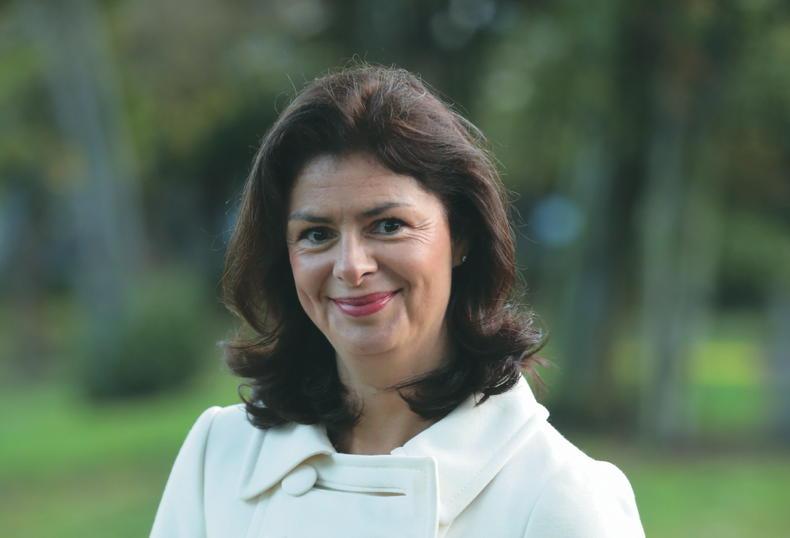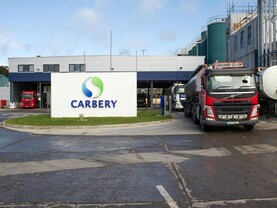The defence of the agriculture sector in the climate emissions targets debate over the last year was not strong enough, the CEO of the National Dairy Council (NDC) has said.
Zoe Kavanagh said that in the lead-up to the 25% carbon emissions reduction target being set, the debate was “too simplistic” and that there was a failure to differentiate between cows and cars.
“We lost sight of the fact that dairy farming is food production. A lot of the positives got lost in the debate,” she said.
The lack of a co-ordinated approach and consistent messaging did not help the sector, she told the Irish Farmers Journal.
“There’s a fragmented approach. Many parties have messaging which is delivered depending on their agenda and I think perhaps if we look back, we should have had a consistency of message and the correct appointed individuals to conduct that messaging.
“Certainly the delivery of the message and the defence of the sector was not strong enough over the last year.” She added that there was another element, in the form of politics driving policy, rather than science.
The NDC boss believes that there should have been an alignment around the facts and the talking points.
This, she believes, would have ensured that anyone who stepped up to communicate in media was operating off the same level of facts.
“Moving forward there is a real need to ensure that all organisations who are working on behalf of agriculture are very clear on their brief. There are certain organisations who will clearly work on policy.
“Then for an organisation like the National Dairy Council, we have said to the sector that we are looking for a fully supported mandate where we own the dairy dialogue between the dairy sector and the Irish public.
“That dialogue is underpinned by facts and financially backed and ensuring that we have our voice across a variety of media with a co-ordinated message.”
She said that fully trained available ambassadors and spokespeople for the sector are needed “who are briefed and are accurate at providing proof points to inspire trust” in the sector.
Farmers also need to be given the right advice to achieve the right outcome on the emissions front, she said.
“An awful lot of good practices have been identified. I think it’s now about accelerating the rate of adoption of those practices and then allowing the more innovative practices to be really clarified in the next three years.”
NDC funding
The NDC has adopted a new strategy with two pillars – articulating farmers’ social licence to produce, and giving consumers reasons to consume Irish dairy. On the first pillar, the NDC will take a leadership role to advocate on behalf of dairy farmers. Meanwhile, the second pillar comes in the form of the nutrition, taste and versatility of Irish dairy.
Co-ops which have previously not backed the NDC have come on board, with Kavanagh stating that by the end of 2022 the NDC will be close to representing 100% of Irish dairy farmers through the levy system.
“That’s a big change. There’s a clear need for the sector to work on social licence to produce. We would hope to end this year with 100% representation. We were at 65%, we have moved to 85% so far this year. From a funding perspective, the widening of the membership brings in an incremental €1m per annum and we would hope to increase that by the end of the year.”
With this tighter focus, I think we’ll have much more impact
Kavanagh insisted that the farmer levy, which delivered in €3.6m in income for the body in 2020, represents value for money for milk producers. However, she admitted that the NDC plans to change how it uses the levy in the future. “So in the past we very much took the farmer levy and used it to promote the consumption of the product while also working on the reputation of the Irish dairy sector in Ireland.
“I think we were perhaps doing too many things with the levy that we had. With this tighter focus, I think we’ll have much more impact but I think when you get down to a pillar like social licence to produce and you say what exactly needs to be done, it very clearly becomes metric-driven.
“We have identified statements like percentage of Irish consumers that agree that Irish dairy farmers care for the environment, percentage of the population that trust dairy farmers, percentage of population who are aware of the advantage of grass-based dairy production. We’re tracking these statements and because we’re tracking them it’s making us much more focused about where we invest farmer levy and for what outcome.”
Kavanagh said the NDC is also in discussions with service providers to the dairy sector for further income streams. These providers could come in the form of equipment suppliers, in terms of genetics and breeding organisations.
Climate action and trust
COVID-19 and the pandemic has helped with dairy consumption and the regard for the dairy portfolio, Kavanagh added, but the whole climate action debate has deteriorated trust in the production system.
“That for us is our absolute priority, to restore that trust and to demonstrate through proof points that we’ve got a really good, sustainable production system,” she said.
Ploughing
“We are not going to the Ploughing this year. I’m delighted for them that it is going ahead, but within the context of our work programme for 2022, and particularly the social licence to produce, we felt the Ploughing was not something we would commit our resources to in 2022.
“It’s a huge commitment from the team, it’s a huge commitment financially and certainly for this year our time and energy is much better spent liaising with the Irish public and educating them about Irish dairy farming practices.”
Diversity
“We need to diversify the board. I sometimes say to the board that when I mix the executive team with the board then I have good gender balance. But both my executive team, as well as the board, to have a much more diverse representation.”
Lyons or Barrys: Barrys.
Most recent book you read: Lessons in Chemistry by Bonnie Garmus.
Favourite film: Shawshank Redemption.
Hobby: Horse riding.






 This is a subscriber-only article
This is a subscriber-only article











SHARING OPTIONS: